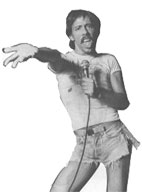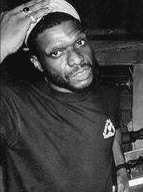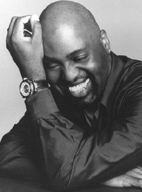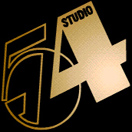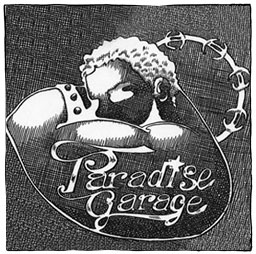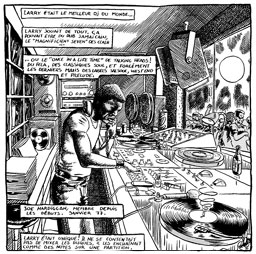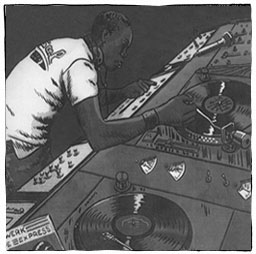New York 1969, gays assert itselves. The first clubs in New York grow up and magic is simply to say their names (often with French accent). There are "Shepheards" or "L'Oursin" but also "Le Jardin", "12 West", "Sanctuary", "Hollywood", "Limelight - Fashion Disco", "Salvation", "10th Floor", "Haven", etc... Michael Capella, Francis Grasso, Dj Guttadero and David Rodriguez are any of the fundamental djs of this period. Disco (the music) was not a style of music, but these guys invent the bases mixing tracks of R'n'B, Jazz et Latin music. Exemples ? Booker T and the MC's: "Soul Limbo", The Supremes: "Sing", Santana...
Then a new club not like the others opens, a club that will break all. Near Broadway eand Bleecker Street in a place of Chelsea, in New York, the "Loft" opens in 1971. This was not a club but a real loft, a home where lived dj + organiser David Mancuso.
 "The Loft"
"The Loft" |
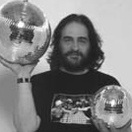 "David Mancuso"
"David Mancuso" |
"We all are LOFT babies". The fabulous story of House music begins like this, with 200 people united all week-ends at Loft. You need the card to enter. To have it it was not easy.
You must love the music like Mancuso does and it is better that you are gay, too. Blacks, latinos and whites all united with the best Sound-System in town.
For the first time, a place had a Sound-system with dull basses... So much that the Loft Babies went crazy !! Passing out of the Authority, because of private parties, Mancuso cannot sell any alcool drinks. Being not a real club, Mancuso can close when he wants. It's why all the people come at late night, not before 6 A.M. During years, he will continue the Loft experience from Loft to Loft, from homes to homes.
Another pioneer:
Nicky Siano!
14 years old, he went to clubs.
16 years old he is member at Loft and at 17 years old (in 1971), during the summer-closing of the Loft, he opens the "Gallery".
This club has immediately a big success and has guests like Grace Jones or Loleatta Holloway for their first shows.
Nicky was the first dj that was recognized by the record industry.
Other pioneers:
Frankie Knuckles and Larry Levan ...
They will be the creators of House music.
In 1969, Frankie Knuckles, 15 years old, meets the young Larry Levan... In 1972, they work together at the Gallery thanks to Nicky Siano.
They discover there their first turntables and follow the good advices of Mr Siano..
In 1972, Disco music did not exist musically, but a new sound from Philadelphia of two producers Kenny Gamble and Leon Huff is very appreciated. Their record label is called P.I.R. (Philadelphia International Recordings) and they invent the famous Philly Sound. This is Disco first form; a symphonic and rich style with universal lyrics. With the master Vince Montana Junior, all the recordings of Gamble and Huff (Billy Paul, O'Jays, MFSB...) are really great!
1973, this time is Glam, Broadway meets T-Rex and Disco explodes. In New York all the djs are looking for a record called "Soul Makossa" signed by an unknown Manu Dibango. There's who says that this was the first Disco-track, but the first one could be also "Armed and extremely dangerous" of First Choice or (big hit) "Superstition" of Stevie Wonder.
1974, Miami between USA and Cuba is the beginning of intensive Disco-music production. H.W. Casey and Richard Finch produce George Mc Crae "Rock you baby", then KC & the Sunshine Band... All the stuff n°1 near Barry White and Van Mc Coy. These were the first Disco-Hits.
WORDS OF A PIONEER:
TIM MOULTON
"It was true that from '74 Disco was on radios, but the problem was that all these tracks were too short. Only 3 minutes ! My dream was to re-mix these tracks for my people and my dancers."
Tim Moulton is the little Genius of Disco. He has invented 5 things for the music: the slip-cueing, the break, the medley, the remix and the maxi-single. Dj at club "Sandpiper" in Fire Island (New York), Moulton has the particularity to not do the mix live. He did their mix at home and then played them in the club. He said he loved the reactions of people, it's why he can't do the mix and see the reaction of people at the same time.
In 1975, Neil Bogart signed on his "Casablanca records" "Love to love you baby" of Donna Summer, produced by Giorgio Moroder. 17 minutes of sex, with a new rhythm brought by the "Bass Drum".In Europe, Moroder and Cerrone listen to the Rhythm-Machines of Kraftwerk and decide to use them for ³Dance music². Disco becomes technological.
In 1976 Disco is everywhere with Village People, Gloria Gaynor, Dolly Parton, Loleatta Holloway, Bee Gees, The Jacksons, Sylvester, Sister Sledge, Thelma Houston, Candy Station, Silver Connection and in the world explode the "Saturday night fever" in discos, clubs, record shops, radios, tvs, in the streets, at the cinemas, etc...
In this period, we pass from a little New-Yorkese reality of gays and passioned people to a worldwide vision of Disco ! The most important Disco-group of this period is certainly the one of Nile Rodgers and Bernard Edwards, owners of Chic!!!
For the best and the baddest,
Studio 54 remains the most famous Disco-club. It takes place in the old tv studios at 254 of 54 Avenue.
The adventure of 54 began from two University friends: Steve Rubell and Jan Schrager.
April 26, 1977 the 54 has had as guests, glamourous people like Cher, Elton John, Andy Warhol, etc...
Inside people were REALLY crazy ! Nicky Siano was the resident dj.
The 54 closed February 2, 1980. Now we know that Steve Rubell is dead (AIDS ?) and Ian Schrager is owner of international Hotels like Delano in Miami.
But recoming in 1977 and taking place at King Street in Greenwich Village, a new club opened. Its dj was Larry Levan.
During 10 years, from 1977 to 1987 this guy has had his place, residency and temple.
The Paradise Garage!
The club was enormous but there were member-cards but warning! No VIP, because we were not at Studio 54... Here they wanted only true and deep people.
People that love the music; Soul, sounds, latins and afros, people that dance all the night, all the morning, people that feel the vibration!
SEBASTIO JR, member from 1981 said:
"I remember my first time at the Paradise Garage, never forget the anxiety that I was going this long corridor where he felt the sound vibrate everywhere. This fucking dark Boom Boom! And there bastassa push these doors and you were in paradise! sometimes I thought that God had come to dance among us! 2000 people together to dance, vibrating, screaming and singing ... the body and the soul! it was so intense! My best memory of the Paradise Garage? Hmm ... Vers 1982, an evening Levan at both stops the sound takes the microphone and says: my friends thank you! Good to have you! Attention is his first live performance! From Monday, the feel of WBLS, Cımon dance and sing to the sound of Madonna! Madonna was ... His very first show!"
BEVIS HILLIER, member from 1978 said:
"The weekend of the death of Marvin Gaye in 1983, everyone was talking about this fact ... Marvin murdered by his own father! Larry waited until morning ... There remained hardly anyone and 9, Larry has mixed an hour magic of Marvin Gaye and together we danced, sang and cried!"
JOSH CURRY, member from 1977 said:
"In '81 who was playing for the first time one of his best productions, because Larry was also a large producer know! And at the break of the song called "Heartbreak" for Taana Gardner, there is this rhythm that mimics the beating of a heart, and Larry has mixed with a real heartbeat. The red lights were always more powerful with each beat. He slowed the disc has stopped the heartbeat and there was a dead silence!"
VICKY WELSH, member from 1984 said:
"Larry was a strange guy, you know. Once, the evening had already begun and Larry from his cabin by DJ Disco had noticed that the balls were not clean and there, I swear ... You got out of his console, he took a scale and went himself to clean the balls Disco! the disc has stopped, the audience did not say anything looking at him. Then he put on a record and people are crazy! "
NICK MUSTO, member from 1981 said:
"And when the evening was over and all fall ... well ... you know what ... ??! Larry remained sleeping at Paradise Garage! He slept there! This club was his life"
JOE HARDIGGAN, member from 1977 said:
"Larry tell us a story"
THE HOLDER of Vinylmania, record shop a few feet of the "Paradise":
"I opened the shop with my wife in 1978. At first it was selling more than the Stones and the Beatles. I saw land every Sunday morning some people were asking me sballatache disks Larry. Larry from here and there but who is this Larry? I mean ... I knew some music ... once I understood, I hired two employees who went to Paradise; Judy Russell and Manny Lehman. you should have seen those famous Sundays! C 'were 30, 40 people who were in the queue waiting for the opening of my shop. Manny dishes rested on the Hit that Larry had just played hard and were leaving as sandwiches ... We were selling well 60 of the same piece at a time! "
One day the members of Paradise Garage received this letter:
"It happens in our lifes that something magnificent blows out. This makes us unhappy, because we cannot see it and feel it near us. We must keep this flame in our heart; do not have regrets."
It was the end of the Paradise Garage, September 25, 1987.
Not as known as the Paradise Garage, the Fun House in Manhattan (26th Street) was an essential club, too. This was a club from a Bronx'native, called John Jellybean Benitez and his gang of Latin rascals; Arthur Baker and John Robie, the creators of electro-sound. People there was only latino and italo. Jellybean Benitez left the club in June 1984. The guy that takes his place was a future star; "Little"Louie Vega of Masters at Work. Fun House closed at the end of 1984.
At this moment comes Chicago, 3rd city of the United States with a black ghetto of 1,5 millions people. It's there where the History begins. It's where House music was born.
The History of Chicago has a story with Larry Levan and Paradise Garage. Just after Paradise Garage's opening, a promoter of Chicago that has opened a club called the "Warehouse" was in New York to convince Larry Levan to play in his club. But Larry didn't want to go out of his "house"; the Paradise. So, it's why his friend Frankie Knuckles decided to go to Chicago. The Warehouse had un incredible success. The city had never seen un club like this and Knuckles looked like a sorcerer, a magician with all the dj science he has learned in New York. At Warehouse club, near Frankie there was all the Black Homo Community of Chicago.
Musically Frankie Knuckles was Philly Sound orientated. He has always had a chic and precious way to do the things, also appreciated when you listen to his productions.
But when the Disco Sucks was fallen on the States, the production went down. Tempo was slower and the sound was more Funk. But in Chicago, the kids didn't want cooler music. It's why Frankie began to remix the tracks. And in an afternoon in 1981, Frankie Knuckles walking in the streets of Chicago he saw an ad near a Bar where was written: "Here we play House music". He asked people about what's this kind of music and they answered him: - But Frankie... It's the music you play at Warehouse!
Important is to say that in 1981, Knuckles played only Disco... House music didn't exist but the name already did! And, in the record shops they have created new "House" stamps for some new records. "House" was the word used also to say the name of the club, the Warehouse. And then House was, above all, music created at home without Charges. Mel Cheren from West End Records describes House like Disco with low budget. We need only these two machines to do the music:
- Roland 303 (for basses)
- Roland 909 (for rhythms)
It was like this that House tracks was created... No musical structure, but blast rhythm and groove... Like at the Warehouse !
In 1983, Knuckles was disappointed with the Warehouse's property and started a new club called "Power Plant". The boss of Warehouse was crippled. He must find a new Frankie Knuckles ! He found a guy from California, Ron Hardy and he opened a new club called "Music Box". Ron Hardy is a very good dj, technically perfect. Frankie Knuckles and Ron Hardy had a lot of supporters that were the creators of the new tracks played by the djs..
Jamie Principle was one of the first "home" producers. Fan of Depeche Mode, David Bowie and Prince, he has written legendary House tracks in 1983, like:
- Your love
- Waiting for my angel
If we know that Marshall Jefferson, other pioneer (incredible his "Move your Body"), did the tracks for Ron Hardy, we can say that House music and clubbing was only one thing !
Officially, the first House track printed in vinyl is "On & On" of Jesse Saunders, in 1984.
Then come the first classics:
- Lil Louis: "French Kiss"
- Steve "Silk" Hurley: "Jack your body"
- Joe Smooth: "Promised land"
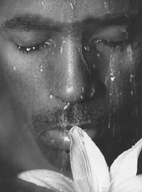 "Lil Louis"
"Lil Louis" |
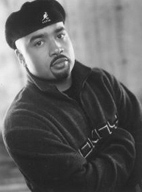 "Steve 'Silk' Hurley"
"Steve 'Silk' Hurley" |
Chicago is House ! North Side was Ron Hardy's Country, West Side was Lil'Louis'zone and South Side was reserved to Jesse Saunders.
For the first time a new music has has a media to promote it ! A radio show and what a show ! "Hot Mix 5" with guys like Farley Jackmaster Funk and Ralphi Rosario. Two hours of mix per day during lunch. House music was the Soundtrack of the poor America where normally Hip-Hop is the most played. From Chicago, House music was the style of music that could explode in the rest of The USA, but... For doing this, we must do Hits and for commercializing them, we need record labels...
Two record labels were leaders in this period: Trax records and Dj International records.
But bad ones, because they gave a little bit of money when they received the original tracks, then nothing ! The Hits sell a lot in the UK, but the Authors didn't take any money. It's why the sene went down. Some artists signed with Majors, then other ones quit Chicago for New York City. In 1985, Chicago was the city of the future for the music and 5 years after it's a ghost-city. The Chicagoer says now that House music was only a parenthesis. In the same time, in the rest of the world... It's a House success !!!
For example, in 1986 in Europe MARRS comes out with "Pump up the volume" and the track becomes a worldwide BIG House Hit...
The masses discover the sample and from this track House music invades the world !!!
Some things are taken from the French book "Le Chant de La Machine"
For more informations: UNESCO.
Post Scriptum: In the fonts of UNESCO's official page dedicated to Club Culture, there is ALSO House Machine!!!
The movie about the history of House Music.
... larry levan @ paradise garage
The
Paradise Garage was located at 84 King Street (between Hudson and Varick Streets). From the 1976 opening night to the 1987 closing party, Larry Levan was behind the turntables.
He died November 8, 1992 of cardio endocarditis; he was 38.
He is the star of Garage music
Thanks 2 David Blot @
"Le Chant De La Machine"
Editions Delcourt






